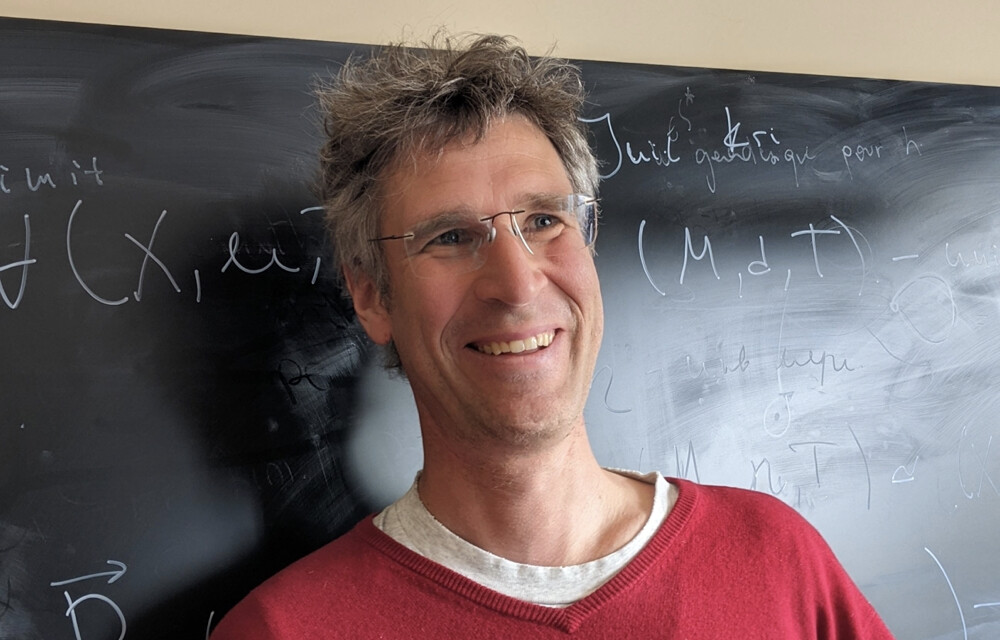€2.5 million for basic research at the interface of mathematics and computer science

Prof. Dr. Laurent Bartholdi
An ERC Grant is one of the most lucrative research prizes bestowed by the European Union. Professor Laurent Bartholdi of Saarland University has been awarded an ERC Advanced Grant – the highest category of ERC Grant that can be given to an individual scholar. Over the next five years, mathematician Bartholdi plans to use the €2.5 million grant to study problems that are located at the boundary between mathematics and computer science.
A further ERC Advanced Grant has been awarded to Professor Andreas Zeller, Faculty member at CISPA Helmholtz Center for Information Security and Professor of Software Engineering at Saarland University.
‘We’re addressing problems that are at the limits of what can be understood,’ said Laurent Bartholdi, describing the sort of topics that he will be working on over the next five years and for which he has received substantial research funding from the European Commission. And the €2.5 million? ‘Well, I won’t be buying myself a Porsche and a swimming pool,’ said Professor Bartholdi tongue-in-cheek, ‘What I will be able to do, however, is fund a lot of new research positions in my group.’ And that young research talent will – hopefully – help him to solve some of the hard-to-grasp problems that sit at the interface between mathematics and computer science.
And the phrase ‘hard-to-grasp’ is not being used lightly here. While the title of the research project ‘Automata, Dynamics and Actions (ADA)’ is short and easy to read, the underlying content is a lot harder to comprehend, especially for anyone who has not studied mathematics or computer science or, better still, both. ‘One topic concerns the growth of groups. A group is an algebraic object. We’ve been able to represent these groups geometrically for over 100 years,’ explained Bartholdi. However, the resulting ‘group representations’ throw up mathematical problems that Laurent Bartholdi and his ERC-funded research group want to tackle over the next five years.
These representations take the form of graphs – mathematical structures of vertices (nodes) that are connected via edges (links) – and the more complex this arrangement of vertices and edges is, the more complex the underlying mathematics. ‘If, for example, I live in a village where there is only one – infinitely long – street, then I can visit exactly 2n+1 neighbours by walking n steps from my house. But the number of houses that I can reach increases if I live in a city like New York, whose graph would be in the form of a grid. In this case, walking n steps would let me reach around n² houses. And if I lived in a tree that has two branches, and each of those branches splits into two sub-branches, etc., then the number of neighbours I can visit will grow exponentially,’ explained Professor Bartholdi.
One of the projects in the newly funded research group will be studying the properties of these groups themselves. In another project, the focus will be on the connections between such groups. A third area of interest is concerned with logical problems. ‘Our interest here is in theoretical computability and non-computability,’ said Bartholdi. In other words, is a particular problem solvable by computation or does it remain an unsolvable problem? According to Laurent Bartholdi (and Douglas Adams fans will need to hold on tight here): ‘There is no algorithm in the world that can generate the correct answer to all questions.’
Sound abstract? That’s because it is. And that’s because ERC Advanced Grants are explicitly awarded to established researchers who want to pursue groundbreaking, high-risk projects. And the research work that Laurent Bartholdi is looking to undertake is certainly that – basic research in its purest form. It’s also no coincidence that Swiss-born Bartholdi was selected by the EU Commission for this prestigious funding award. The decision is, in fact, completely logical. Since 2021, Bartholdi has held a cross-institutional professorship at the Department of Computer Science and the Department of Mathematics at Saarland University, a professorial position that has brought these two closely interlinked disciplines even closer together. ‘I am really pleased that I was given the professorship in Saarbrücken,’ said Bartholdi. Saarbrücken is an ideal location, perhaps unique in Europe, where research into questions from both academic disciplines can be conducted at the very highest level.
A further ERC Advanced Grant has been awarded to Professor Andreas Zeller, Faculty member at CISPA Helmholtz Center for Information Security and Professor of Software Engineering at Saarland University. Zeller’s research focuses on the development and analysis of complex software systems. The ERC is funding Professor Zeller’s project ‘S3 – Semantics of Software Systems’ through the award of an ERC Advanced Grant worth €2.5 million over the next five years. This makes Andreas Zeller one of a select group of scientists who have received Europe’s highest research grant for the second time.
Further information:
Prof. Dr. Laurent Bartholdi
Tel.: +49 681 302-3227
Email: bartholdi@math.uni-sb.de

